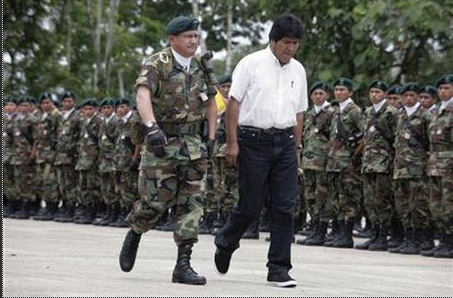
(above) Bolivia's President Evo Morales (R) reviews military guard in Chimore, in the Chapare region some 600 km (372 miles) southeast of La Paz, November 1, 2008. (Photo: REUTERS/David Mercado)
Bolivia says to fund drug war after dispute with U.S.
November 6, 2008 - Reuters
By Eduardo Garcia
LA PAZ (Reuters) - President Evo Morales, who has banned U.S. anti-drug agents from working in Bolivia, said on Thursday his country can fight cocaine trafficking on its own.
Morales, a leftist who used to be a coca farmer, ordered the U.S. Drug Enforcement Administration, or DEA, to stop its work in Bolivia on Saturday after accusing the agency of spying and conspiring to overthrow him.
"Some politicians say that with the withdrawal of the DEA, drug trafficking will increase ... I trust that our national police is prepared to fight drug traffickers," Morales told police officers in Bolivia's administrative capital, La Paz.
"We're capable of funding the operations of the national police against drug trafficking," he said in a speech.
Earlier this year, Morales' anti-drug czar Felipe Caceres said Bolivia should "nationalize" the fight against the drug trade, saying the government was ready to invest some $16 million to that end.
Bolivia is the world's No. 3 cocaine producer, behind Colombia and Peru. Much of the illegal cocaine produced in Latin America makes it way to the U.S. market.
Morales has accused the DEA of ties to anti-government groups that staged violent protests in September.
Relations between Bolivia and the United States turned sour after Morales expelled the U.S. ambassador in September, accusing him of inciting the protests.
Washington has called the accusations "absurd" and warned that cocaine production could boom if Bolivia cuts ties with the DEA. Washington contributes some $25 million per year to anti-drug operations in the impoverished nation.
The U.S. government responded by ejecting Bolivia's envoy to Washington and soon afterward put Bolivia on a list of nations that had "failed demonstrably" to fight drug smuggling.
Since taking office in 2006, Morales has pursued a policy of "zero cocaine but not zero coca," which allows tens of thousands of farmers to grow coca plants on small plots for legal uses. The United States calls the policy "permissive."
The coca leaf is the main ingredient for cocaine but Bolivian Indians use it in rituals and chew it for its medicinal and nutritional properties.
Morales is a close ally of Washington's leading regional foe, Venezuelan President Hugo Chavez, and he routinely attacks U.S. foreign policy. Chavez also halted cooperation with the DEA in 2005 after accusing the organization of spying.
(Editing by Patricia Zengerle)